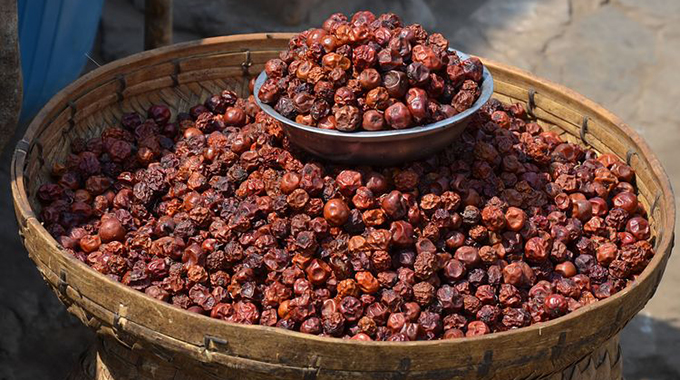Unpacking the secret in dried fruits

Kundai Marunya, Lifestyle Writer
A bowl lay on the table. Its contents are not the usual breakfast cereal by a highly nutritious combination of warm milk and dried fruits; a growing trend with foodies.
One spoon scoop gives one an explosion of taste and flavour.
An enriching sensation that does not only fill up one’s tummy, but also gives great energy.
Albeit, this is not absolutely new to local communities.
Dried food has always been part of our society; mostly being used as a method of preservation.
We have mufushwa (dried vegetables) mukuyu (dried meat) and off late dried fruits.
Dried fruits have become a popular not only because they are preserved for longer period of time, but also because of their high nutrition value over fresh fruits.
Research indicates that a piece of dried fruit contains about the same amount of nutrients as the fresh fruit, but compressed in a much smaller package.
By weight, dried fruit contains up to three and half times the fibre, vitamins and minerals in comparison to fresh fruit.
This then translates to one serving on providing a large amount of daily recommended intakes of many vitamins and minerals.
Commonly dried fruits are grapes (consumed as raisins), bananas, and plums (consumed as prunes) among many other fruits.
They are usually served as breakfast cereal, laced warm milk or yoghurt while some prefer to snack on them dry.
Some prefer to chew on them as snacks.
Various dried fruits have different nutritional and health values, ranging from reducing the risk of heart diseases to helping fight osteoporosis (a disease in which the density and quality of bone are reduced).
Nutritionist Dr Raymond Mukurunge said raisins can reduce blood sugar related diseases.
“Raisins are rich in fibre, potassium and various health-promoting compounds. They have a low to medium glycemic index value, and a low insulin index,” he said.
“This means raisins do not cause major hikes in blood sugar or insulin levels after meals.
Instead, they lower blood pressure, improve blood sugar control, decrease inflammatory markers and blood cholesterol and lead to increased feeling of fullness.
“All of these factors should contribute to a reduced risk of developing type two diabetes and heart disease.”
Prunes are rich in fibre, potassium, beta-carotene (vitamin A) and vitamin K.
These nutrients are known for their natural ability to help stimulate bowel movements or loosen up stool to ease its passage.
They are used to treat constipation.
Prunes are high in fibre and a sugar alcohol called sorbitol, which is found naturally in some fruit.
“Eating prunes improves regularity stool frequency and consistency. Prunes are considered to be even more effective at relieving constipation,” said Dr Mukurunge.
“As a great source of antioxidants, prunes may constrain the oxidation of cholesterols and help prevent heart disease and cancer.”
According health website healthline.com, research indicates that “prunes are rich in a mineral called boron, which can help fight osteoporosis.
“Furthermore, prunes are very filling and should not cause rapid spikes in blood sugar levels,” writes the website.
Dried bananas have also increased their popularity and these are usually dried when they become ripe to avoid rotting.
Drying them improve convenience as they can be easily stored.
Many people now prefer dried bananas chips for their crunchy texture and improved flavour.
Local entrepreneur Farai Dauramanzi has been drying bananas.
“I slice my bananas and nicely place then between two glasses and then put them on the sun,” he said.
Dried bananas contain between six to eight percent magnesium, three percent phosphorus and between four to six percent vitamin A.
They are also rich in fibre, iron and potassium.
According to Oregon State University’s Linus Pauling Institute, dried bananas contain at least a third of recommended fibre intake per serving.
Same as other dried fruits, dried banana chips prevent constipation, lowers one’s blood cholesterol, controls blood sugar levels, and helps prevent other diseases, including cardiovascular disease and some types of cancer.
“Iron in dried bananas helps form two proteins, hemoglobin and myoglobin, which provide body tissues with a fresh supply of oxygen,” said Dr Mukurunge.
“Due to the vast potassium, eating dried banana chips can also help prevent nausea, fatigue and constipation.”
Raisins are another very common dried fruits and are especially popular with bakers in the culinary world.
They are also used as salad topping, while others mix them in oatmeal as breakfast cereal.
Raisins though small size, are packed with energy and are rich in fibre, vitamins and minerals.
They are sweet and are high in sugar and calories.
Their health benefits include aiding digestion, boosting iron levels, while they also keep one’s bones strong.
Raisins are also rich phytonutrients, such as phenols and polyphenols which are antioxidants.
Instead of the usual snacks that are considered unhealthy, it is wise to munch on dried fruits which are natural and can be easily carried around in small packets than their fresh counterparts.









Comments